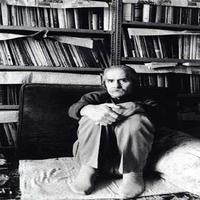Akhavan Salis

Akhavan-i Salis, Mahdi (1928-1990), son of Aqa ‘Ali ‘Attar. A poet with the nom de plume M. Umid, born in Tus, Mashhad. Having received his primary and secondary education and having graduated from the Vocational School in Mashahad in 1947, he settled in Tehran, where he taught at schools and contributed to periodicals. He was imprisoned for his political activities in 1952 and served a two-year term. He was imprisoned again in 1955 and following his release he taught contemporary literature at universities. He also performed on appealing TV literary programs for a while. Later he retired from social activities, devoting his time to conducting studies, creating literary works, and writing poetry.
He traveled to England, Denmark, Sweden, Norway, and France in 1990 where his literary compositions were well received by many an Iranians living abroad. He was taken ill upon his return and died in the same year. He was laid to rest beside Firdawsi’s tomb in Tus.
Akhawan is mentioned in some contemporary sources as a profound, intellectual, free, benevolent, a genuine critical character, and an authority in classical literature and Persian free verse. He also created successful poetical masterpieces in classical and modern poetical forms. He wrote prose poetry in 1956 and thus wrote in the introduction to the second edition of his Akhir-i Shahnama (‘The End of Shahnama’): ‘My first experiences in composing free verse appeared in a an art journal, but later I was not happy with that form. I felt as if some poetical element was missing; some poetry incomplete in itself. Whatever, you may designate them as complaints, stories of my heart, tales, narratives, rather than poetry, or you may call them by any designation of your choice.’
Having had his experiments in composing prose poetry for a while, he turned once more to classical poetry wherein he is as successful as his predecessors of renown. Similarly, he is a renowned contemporary poet writing free verse. He mainly makes use of social and at times lyrical themes. In his classical poetry and free verse, he admirably accords significance to the organicism of forms and themes as well as creating the suitable ambience. Although he did not enjoy Nima’s renown in writing free verse, but he has succeeded in bringing the former’s ideas to fruition and also presenting more perfect genres of free verse.
Shafi’i Kadkani states, ‘Umid is not an avant-garde or a prophet on a par with Nima, because set foot in a path well-trodden by dexterous predecessors; nonetheless, it is well-known that artistic grandeur does not lie in opting for untrodden paths, but at times such grandeur and glory lies in perfecting the trodden paths whose destinations had not been known. It is his brilliance and glory to attain a vast and resplendent world, to reach glorious horizons. Firdawsi, the master of epic poetry par excellence, had predecessors and he seemingly followed their footsteps; but Firdawsi’s glory has been manifest down the centuries, though the majority of his predecessors are solely mentioned in literary histories and class rooms. The fact that Akhawan is not a prophet on a par with Nima should not create the impression that he lacks a particular approach, since his independence is unrivalled by other poets, even Nima. Nima’s prophecy implies that he set foot in a path, but it was Akhawan who perfected and academically presented it and its genuine masterpieces.
Likewise, Furugh Farrukhzad writes, ‘Akhawan’s poetry is marked by his rich and resonating diction and also by the social aspect of his poetry which depicts contemporary history. There are other poets whose poetry is accorded particular significance from further perspectives, but from these two angles, Akhwan is indubitably unsurpassed. The main features of his poetry include the creation of a distinctly independent and eloquent diction free from nonsensical utterances. He is the master par excellence of modern Khurasani poetry.’
His works include Urghanun; Akhir-i Shahnama; Az In Awista; Tu Ra Iy Kuhan Bum-u-Bar Dust Daram; Pa’iz dar Zindan; Bihtarin Umid; ‘Ashiqana-ha wa Kabud; Duzakh Amma Sard; Manzuma-yi Shikar; Darakht wa Jangal; Dar Hayat-i Kuchak-i Pa’iz; Bid’at-ha wa Badayi’-i Nima; ‘Ata wa Laqa-yi Nima.
 In association with The Iran Heritage Foundation © All rights reserved 2025. Jane Lewisohn | Website by
In association with The Iran Heritage Foundation © All rights reserved 2025. Jane Lewisohn | Website by